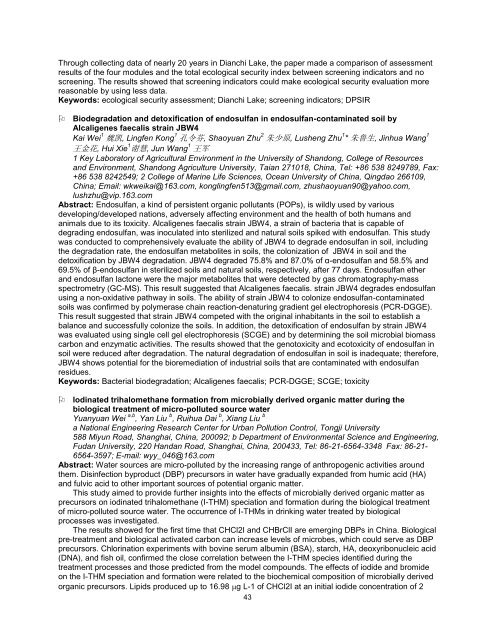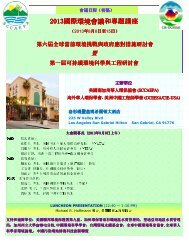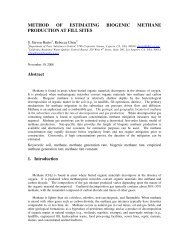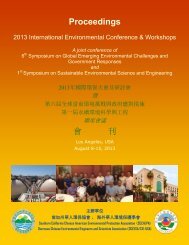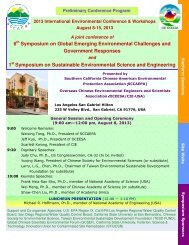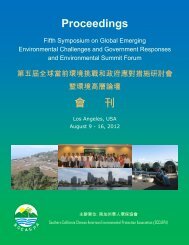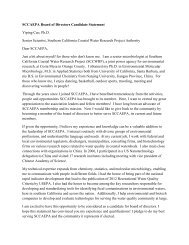Proceedings æ å - SCCAEPA SPONSORS
Proceedings æ å - SCCAEPA SPONSORS
Proceedings æ å - SCCAEPA SPONSORS
Create successful ePaper yourself
Turn your PDF publications into a flip-book with our unique Google optimized e-Paper software.
Through collecting data of nearly 20 years in Dianchi Lake, the paper made a comparison of assessment<br />
results of the four modules and the total ecological security index between screening indicators and no<br />
screening. The results showed that screening indicators could make ecological security evaluation more<br />
reasonable by using less data.<br />
Keywords: ecological security assessment; Dianchi Lake; screening indicators; DPSIR<br />
Biodegradation and detoxification of endosulfan in endosulfan-contaminated soil by<br />
Alcaligenes faecalis strain JBW4<br />
Kai Wei 1 魏 凯 , Lingfen Kong 1 孔 令 芬 , Shaoyuan Zhu 2 朱 少 原 , Lusheng Zhu 1 * 朱 鲁 生 , Jinhua Wang 1<br />
王 金 花 , Hui Xie 1 谢 慧 , Jun Wang 1 王 军<br />
1 Key Laboratory of Agricultural Environment in the University of Shandong, College of Resources<br />
and Environment, Shandong Agriculture University, Taian 271018, China, Tel: +86 538 8249789, Fax:<br />
+86 538 8242549; 2 College of Marine Life Sciences, Ocean University of China, Qingdao 266109,<br />
China; Email: wkweikai@163.com, konglingfen513@gmail.com, zhushaoyuan90@yahoo.com,<br />
lushzhu@vip.163.com<br />
Abstract: Endosulfan, a kind of persistent organic pollutants (POPs), is wildly used by various<br />
developing/developed nations, adversely affecting environment and the health of both humans and<br />
animals due to its toxicity. Alcaligenes faecalis strain JBW4, a strain of bacteria that is capable of<br />
degrading endosulfan, was inoculated into sterilized and natural soils spiked with endosulfan. This study<br />
was conducted to comprehensively evaluate the ability of JBW4 to degrade endosulfan in soil, including<br />
the degradation rate, the endosulfan metabolites in soils, the colonization of JBW4 in soil and the<br />
detoxification by JBW4 degradation. JBW4 degraded 75.8% and 87.0% of α-endosulfan and 58.5% and<br />
69.5% of β-endosulfan in sterilized soils and natural soils, respectively, after 77 days. Endosulfan ether<br />
and endosulfan lactone were the major metabolites that were detected by gas chromatography-mass<br />
spectrometry (GC-MS). This result suggested that Alcaligenes faecalis. strain JBW4 degrades endosulfan<br />
using a non-oxidative pathway in soils. The ability of strain JBW4 to colonize endosulfan-contaminated<br />
soils was confirmed by polymerase chain reaction-denaturing gradient gel electrophoresis (PCR-DGGE).<br />
This result suggested that strain JBW4 competed with the original inhabitants in the soil to establish a<br />
balance and successfully colonize the soils. In addition, the detoxification of endosulfan by strain JBW4<br />
was evaluated using single cell gel electrophoresis (SCGE) and by determining the soil microbial biomass<br />
carbon and enzymatic activities. The results showed that the genotoxicity and ecotoxicity of endosulfan in<br />
soil were reduced after degradation. The natural degradation of endosulfan in soil is inadequate; therefore,<br />
JBW4 shows potential for the bioremediation of industrial soils that are contaminated with endosulfan<br />
residues.<br />
Keywords: Bacterial biodegradation; Alcaligenes faecalis; PCR-DGGE; SCGE; toxicity<br />
Iodinated trihalomethane formation from microbially derived organic matter during the<br />
biological treatment of micro-polluted source water<br />
Yuanyuan Wei a,b , Yan Liu b , Ruihua Dai b , Xiang Liu b<br />
a National Engineering Research Center for Urban Pollution Control, Tongji University<br />
588 Miyun Road, Shanghai, China, 200092; b Department of Environmental Science and Engineering,<br />
Fudan University, 220 Handan Road, Shanghai, China, 200433, Tel: 86-21-6564-3348 Fax: 86-21-<br />
6564-3597; E-mail: wyy_046@163.com<br />
Abstract: Water sources are micro-polluted by the increasing range of anthropogenic activities around<br />
them. Disinfection byproduct (DBP) precursors in water have gradually expanded from humic acid (HA)<br />
and fulvic acid to other important sources of potential organic matter.<br />
This study aimed to provide further insights into the effects of microbially derived organic matter as<br />
precursors on iodinated trihalomethane (I-THM) speciation and formation during the biological treatment<br />
of micro-polluted source water. The occurrence of I-THMs in drinking water treated by biological<br />
processes was investigated.<br />
The results showed for the first time that CHCl2I and CHBrClI are emerging DBPs in China. Biological<br />
pre-treatment and biological activated carbon can increase levels of microbes, which could serve as DBP<br />
precursors. Chlorination experiments with bovine serum albumin (BSA), starch, HA, deoxyribonucleic acid<br />
(DNA), and fish oil, confirmed the close correlation between the I-THM species identified during the<br />
treatment processes and those predicted from the model compounds. The effects of iodide and bromide<br />
on the I-THM speciation and formation were related to the biochemical composition of microbially derived<br />
organic precursors. Lipids produced up to 16.98 g L-1 of CHCl2I at an initial iodide concentration of 2<br />
43


